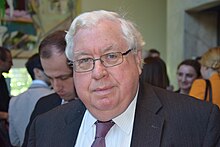John C. Kornblum
| John C. Kornblum | |
|---|---|
 |
|
| Born |
John Christian Kornblum February 6, 1943 Detroit |
John Christian Kornblum (born February 6, 1943, Detroit, Michigan) is an American diplomat and businessman. He entered the American Foreign Service in 1964. Over the next thirty five years, he served in Europe and at the State Department in Washington. Since 2001, he has established himself as an investment banker and international business consultant. He lives in Berlin.
Kornblum is one of the leading experts on transatlantic economic and political affairs and on the evolving role of the Atlantic community in a multipolar world [unsubstantiated statement]. He lectures and writes widely in both German and English and is known especially for his press and television commentaries on the implications of globalization on both sides of the Atlantic.
During his foreign service career, Kornblum specialized in European and East-West relations and played a defining role in many of the important events leading up to the end of the Cold War. These included the Quadripartite negotiations on Berlin (1970–1973), the Helsinki Final Act (1973–1975), the Belgrade Conference of the Organization for Security and Co-operation in Europe (OSCE) from 1977 to 1978, the stationing of [intermediate] nuclear weapons in Europe (INF) in the 1980s, President Ronald Reagan's historic 1987 appearance at the Brandenburg Gate in Berlin, German reunification (1990), the Helsinki Summit Conference of the OSCE (1992), the Dayton Agreement on the Balkans (1995), enlargement of NATO (1997), the post-Cold War security settlement with Russia and Ukraine and the agreement on compensation of slave laborers and establishment of the Reconciliation Foundation of German Industry (2000). Kornblum also served as US Special Envoy to the Balkans (1995-1997) and directed two dramatic prisoner and spy exchanges on the Glienicke Bridge in Berlin in 1985 and 1986. The latter featured the release of Soviet dissident Anatoli Scharanskiy.
...
Wikipedia
